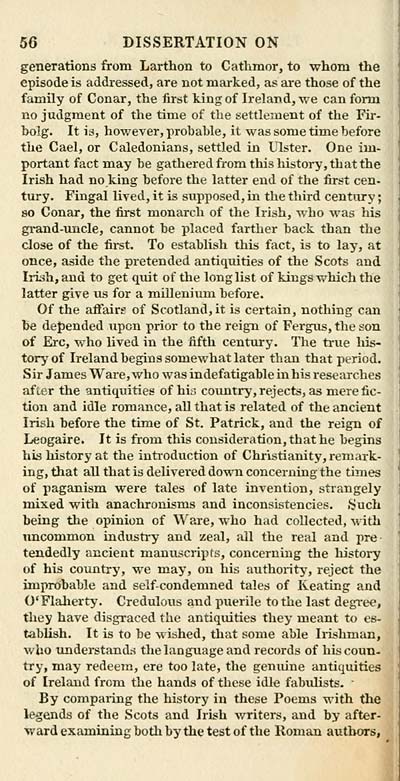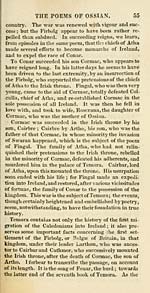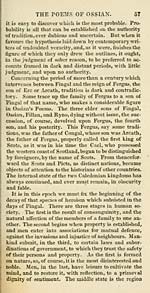Ossian Collection > Poems of Ossian
(64)
Download files
Complete book:
Individual page:
Thumbnail gallery: Grid view | List view

56 DISSERTATION ON
generations from Larthon to Cathmor, to whom the
episode is addressed, are not marked, as are those of the
family of Conar, the first king of Ireland, we can form
no judgment of the time of the settlement of the Fir-
holg. It is, hov/ever, probable, it was some time before
the Gael, or Caledonians, settled in Ulster. One im-
portant fact may be gathered from this history, that the
Irish had no king before the latter end of the first cen-
tury. Fingal lived, it is supposed, in the third century ;
so Conar, the first monarch of the Irish, who was his
grand-uncle, cannot be placed farther back than the
close of the first. To establish this fact, is to lay, at
once, aside the pretended antiquities of the Scots and
Irish, and to get quit of the long list of kings which the
latter give us for a mUlenium before.
Of the aflfairg of Scotland, it is certain, nothing can
be depended upon prior to the reign of Fergus, the son
of Ere, who lived in the fifth century. The true his-
tory of Ireland begins somewhat later than that period.
Sir James Ware, who was indefatigable in his researches
after the antiquities of hia country, rejects, as mere fic-
tion and idle romance, aU that is related of the ancient
Irish before the time of St. Patrick, and the reign of
Leogaire. It is from this consideration, that he begins
his history at the introduction of Christianity, remark-
ing, that all that is delivered down concerning the times
of paganism were tales of late invention, strangely
mixed with anaclironisms and inconsistencies. Such
being the opinion of Ware, who had collected, with
uncommon industi-y and zeal, all the real and pre
tendedly ancient manviscripts, concerning the history
of his coimtry, we may, on his authority, reject the
improbable and self-condemned tales of Keating and
O'Flaherty. Credulous and puerile to the last degree,
they have disgraced the antiquities they meant to es-
tablish. It is to be wished, that some able Irishman,
who understands the language and records of his coun-
try, may redeem, ere too late, the genuine antiquities
of Ireland from the hands of these idle fabulists.
By comparing the history in these Poems with the
legends of the Scots and Irish writers, and by after-
ward examining both by the test of the Roman authors,
generations from Larthon to Cathmor, to whom the
episode is addressed, are not marked, as are those of the
family of Conar, the first king of Ireland, we can form
no judgment of the time of the settlement of the Fir-
holg. It is, hov/ever, probable, it was some time before
the Gael, or Caledonians, settled in Ulster. One im-
portant fact may be gathered from this history, that the
Irish had no king before the latter end of the first cen-
tury. Fingal lived, it is supposed, in the third century ;
so Conar, the first monarch of the Irish, who was his
grand-uncle, cannot be placed farther back than the
close of the first. To establish this fact, is to lay, at
once, aside the pretended antiquities of the Scots and
Irish, and to get quit of the long list of kings which the
latter give us for a mUlenium before.
Of the aflfairg of Scotland, it is certain, nothing can
be depended upon prior to the reign of Fergus, the son
of Ere, who lived in the fifth century. The true his-
tory of Ireland begins somewhat later than that period.
Sir James Ware, who was indefatigable in his researches
after the antiquities of hia country, rejects, as mere fic-
tion and idle romance, aU that is related of the ancient
Irish before the time of St. Patrick, and the reign of
Leogaire. It is from this consideration, that he begins
his history at the introduction of Christianity, remark-
ing, that all that is delivered down concerning the times
of paganism were tales of late invention, strangely
mixed with anaclironisms and inconsistencies. Such
being the opinion of Ware, who had collected, with
uncommon industi-y and zeal, all the real and pre
tendedly ancient manviscripts, concerning the history
of his coimtry, we may, on his authority, reject the
improbable and self-condemned tales of Keating and
O'Flaherty. Credulous and puerile to the last degree,
they have disgraced the antiquities they meant to es-
tablish. It is to be wished, that some able Irishman,
who understands the language and records of his coun-
try, may redeem, ere too late, the genuine antiquities
of Ireland from the hands of these idle fabulists.
By comparing the history in these Poems with the
legends of the Scots and Irish writers, and by after-
ward examining both by the test of the Roman authors,
Set display mode to: Large image | Transcription
Images and transcriptions on this page, including medium image downloads, may be used under the Creative Commons Attribution 4.0 International Licence unless otherwise stated. ![]()
| Early Gaelic Book Collections > Ossian Collection > Poems of Ossian > (64) |
|---|
| Permanent URL | https://digital.nls.uk/81238637 |
|---|
| Description | Selected books from the Ossian Collection of 327 volumes, originally assembled by J. Norman Methven of Perth. Different editions and translations of James MacPherson's epic poem 'Ossian', some with a map of the 'Kingdom of Connor'. Also secondary material relating to Ossianic poetry and the Ossian controversy. |
|---|
| Description | Selected items from five 'Special and Named Printed Collections'. Includes books in Gaelic and other Celtic languages, works about the Gaels, their languages, literature, culture and history. |
|---|

